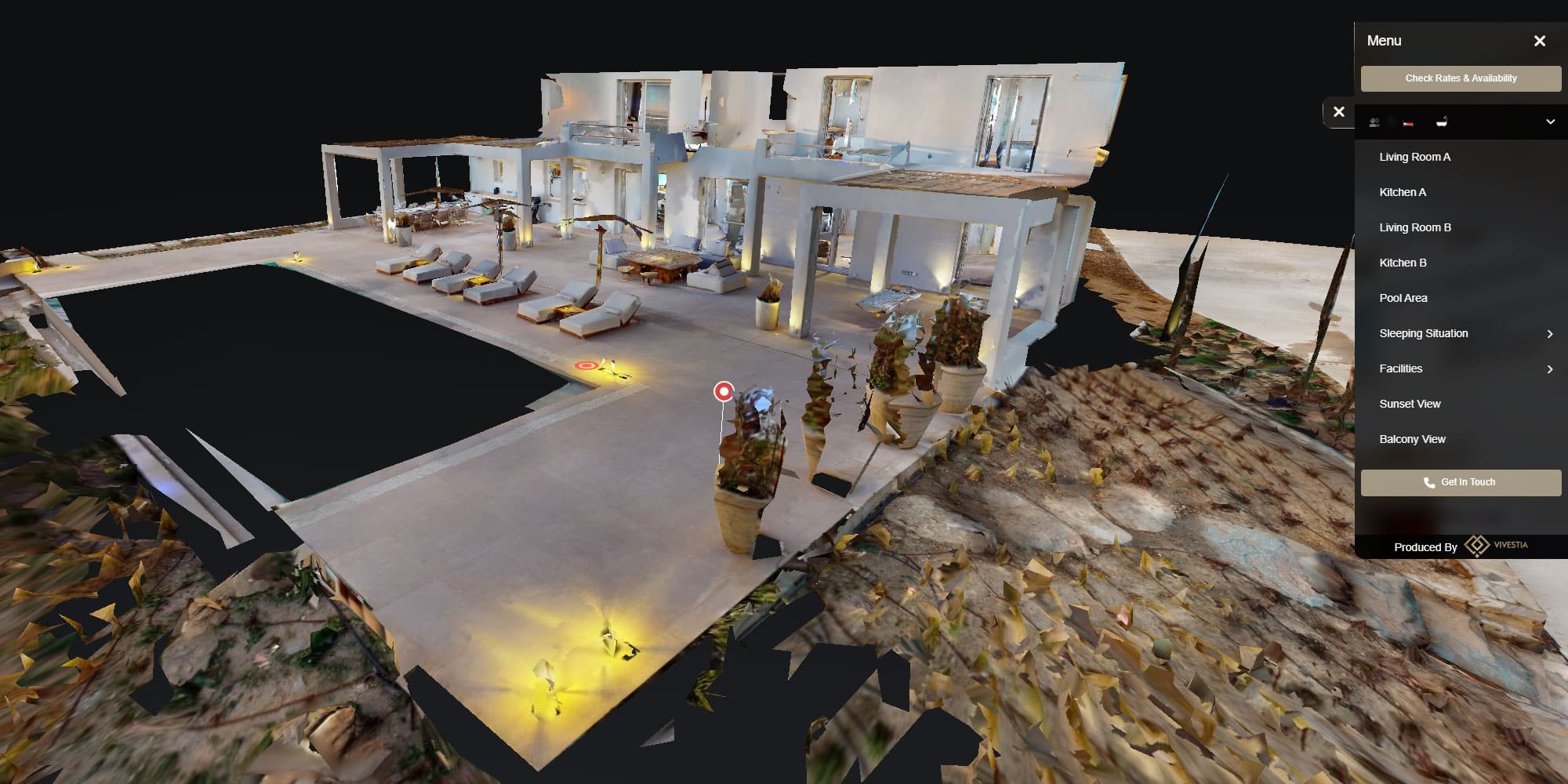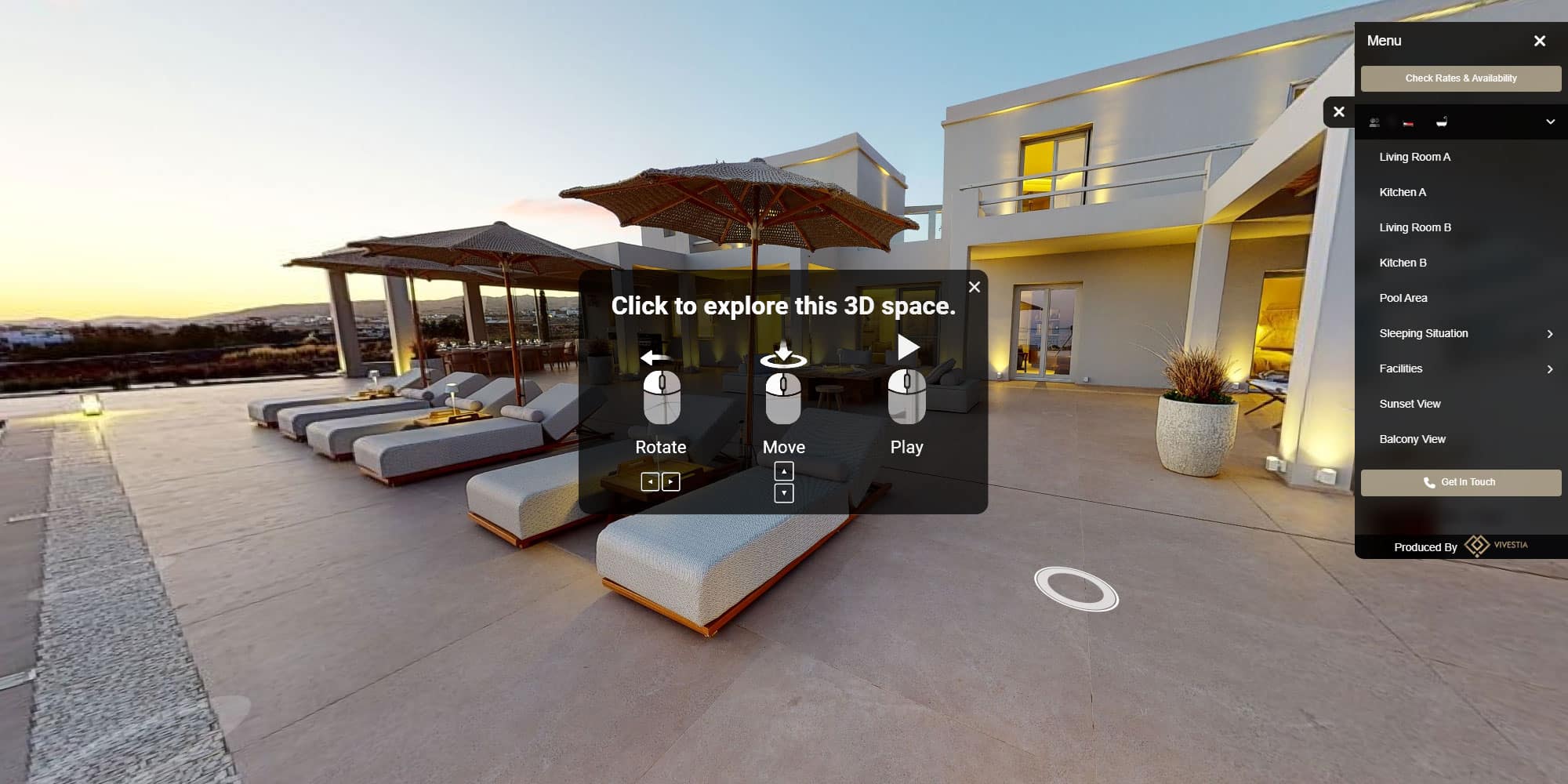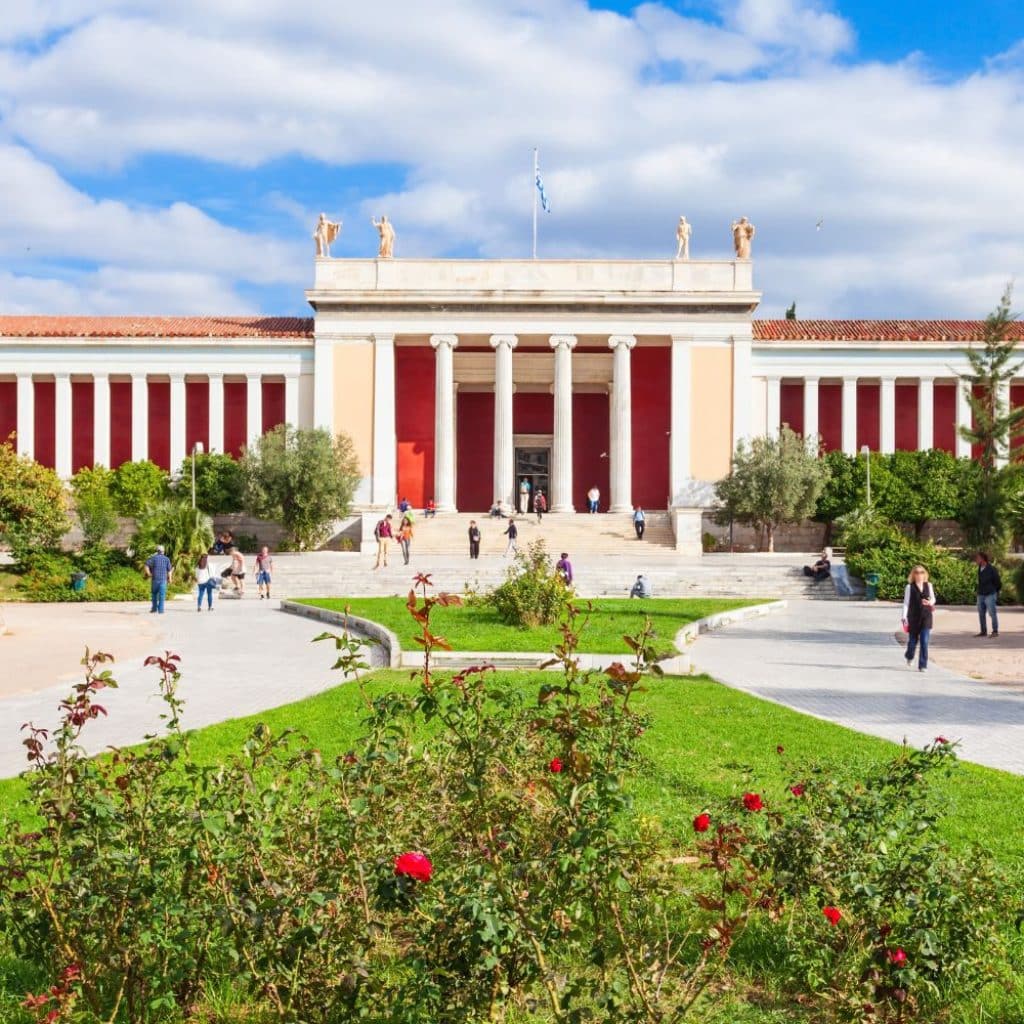Last Updated on 21/11/2023 by Manolis Maragkoudakis
Seeing Is Believing: The Power of Virtual Hotel Tours for Guests

Virtual Hotel Tours
Step into the future of hotel experiences as we uncover the transformative influence of virtual tours on guest engagement. In an era where seamless technology integration is redefining the hospitality industry, virtual tours have emerged as a powerful tool in providing prospective guests with an immersive preview of their potential stay.
With just a click, guests can explore hotel rooms, amenities, and surrounding attractions, enabling them to make informed booking decisions and enhancing their overall experience. From stunning 360-degree views to interactive walkthroughs, virtual tours offer a dynamic and interactive way to captivate potential guests and boost bookings.
The Evolution of Hotel Experiences
The hotel industry has continuously evolved to meet the changing needs and preferences of travelers. In the past, guests heavily relied on static images and written descriptions to get a sense of a hotel’s offerings. However, as technology advanced, the demand for more immersive experiences grew.
This led to the integration of virtual tours as a means to bridge the gap between the online booking process and the actual guest experience. Today, virtual tours have become a pivotal component in shaping the future of hotel experiences, providing a level of transparency and interactivity that was previously unattainable.
As travelers seek authenticity and a deeper connection with their accommodations, virtual tours have emerged as a game-changer in the hospitality landscape, offering a glimpse into the future of guest engagement.
As the demand for experiential travel continues to rise, hotels are increasingly turning to virtual tours to showcase their unique offerings and differentiate themselves in a competitive market. By embracing this innovative technology, hotels can provide an engaging and informative platform for potential guests to explore their properties, creating a compelling narrative that goes beyond traditional marketing methods. The evolution of hotel experiences is now intrinsically linked to the seamless integration of virtual tours, marking a significant shift in how guests interact with and choose their ideal accommodations.
Understanding Virtual Tours in the Hospitality Industry
Virtual tours, also known as 3D tours or immersive tours, are interactive simulations of physical spaces, typically composed of a sequence of images or videos. These tours are designed to provide a comprehensive and lifelike representation of a property, allowing viewers to navigate through the space and explore its features from the comfort of their own devices.
In the context of the hospitality industry, virtual tours offer a compelling way for hotels to showcase their rooms, amenities, and surrounding areas, giving potential guests a realistic preview of what to expect during their stay. By leveraging virtual tour technology, hotels can engage with their audience on a deeper level, fostering a sense of trust and transparency that is essential in today’s digital landscape.
The immersive nature of virtual tours enables guests to experience a hotel’s ambiance, decor, and layout as if they were physically present, creating a more intimate connection with the property. This level of engagement goes beyond traditional static images or standard video tours, providing a more interactive and personalized insight into the guest experience.
By understanding the potential impact of virtual tours on guest engagement, hotels can harness this technology to not only attract more bookings but also to cultivate a stronger emotional connection with prospective guests, setting the stage for a memorable and satisfying stay.
The Impact of Virtual Tours on Guest Engagement
The introduction of virtual tours has significantly transformed the way guests engage with hotels during their decision-making process. Instead of relying solely on written descriptions and still images, potential guests can now embark on a virtual journey through a hotel’s facilities, gaining a comprehensive understanding of the property’s layout, design, and overall ambiance.
This level of immersion empowers guests to visualize themselves within the space, leading to a more informed and confident booking decision. Moreover, virtual tours contribute to a sense of transparency and authenticity, as they provide an unfiltered view of the property, allowing guests to form realistic expectations before their arrival.
The impact of virtual tours on guest engagement extends beyond the initial booking phase. Once guests have experienced a virtual tour, they are more likely to have a clearer understanding of the hotel’s offerings and are therefore better equipped to make informed decisions about room preferences, upgrades, or additional amenities.
This not only streamlines the reservation process but also enhances the overall guest experience by aligning guest expectations with the reality of their stay. By empowering guests with a comprehensive preview of the hotel experience, virtual tours play a pivotal role in fostering a sense of anticipation and excitement, ultimately contributing to higher levels of guest satisfaction and loyalty.
Benefits of Virtual Tours for Hotels
The integration of virtual tours offers a myriad of benefits for hotels, ranging from enhanced marketing capabilities to improved guest satisfaction. Firstly, virtual tours serve as a powerful marketing tool, allowing hotels to showcase their unique selling points and differentiate themselves from competitors.
By providing an immersive and interactive experience, hotels can captivate potential guests and leave a lasting impression, ultimately driving more direct bookings and reducing reliance on third-party booking platforms. This not only increases revenue but also strengthens the hotel’s brand identity and market position.
In addition to their marketing potential, virtual tours contribute to cost savings by minimizing the need for physical showings and property visits. Prospective guests can explore the entire property remotely, reducing the resources and time required for in-person tours.
This not only streamlines the booking process but also attracts a wider audience, including international travelers who may not have the opportunity to visit the property in person. Moreover, virtual tours can be repurposed across various digital platforms, including the hotel’s website, social media channels, and online travel agencies, maximizing their reach and impact.
Furthermore, virtual tours play a pivotal role in increasing guest confidence and trust in the booking process. By providing a transparent and immersive representation of the property, hotels can build credibility and alleviate any concerns or uncertainties that potential guests may have.
This transparency fosters a sense of authenticity, which is crucial in establishing a positive and lasting relationship with guests. Ultimately, the benefits of virtual tours extend beyond driving bookings; they contribute to a holistic and impactful guest experience, setting the stage for memorable stays and positive word-of-mouth referrals.
Implementing Virtual Tours in Hotel Marketing Strategies
The successful implementation of virtual tours in hotel marketing strategies requires a strategic and thoughtful approach. It begins with selecting a reputable virtual tour provider or technology platform that aligns with the hotel’s branding and objectives.
Whether it’s 360-degree panoramic views, interactive walkthroughs, or VR-enabled experiences, the chosen technology should offer a seamless and intuitive interface that enhances the overall user experience. Moreover, hotels should ensure that the virtual tour content is regularly updated to reflect any changes or renovations, maintaining accuracy and relevance.
Once the virtual tour technology is in place, hotels must integrate these immersive experiences across their digital touchpoints, including the official website, social media profiles, and online travel agencies. High-quality virtual tour content should be prominently featured, allowing potential guests to easily access and explore the property from any device.
Additionally, hotels can leverage virtual tours in targeted marketing campaigns, using them as a focal point to showcase special promotions, seasonal offerings, or exclusive amenities. By incorporating virtual tours into their marketing strategies, hotels can create a dynamic and engaging online presence that resonates with their target audience.
Furthermore, hotels can utilize virtual tours as a means to enhance their email marketing efforts. By incorporating links to virtual tours in promotional emails, hotels can provide recipients with an immersive preview of the property, enticing them to explore further and consider making a reservation.
This personalized and visually compelling approach to email marketing can significantly increase open rates and click-through rates, ultimately driving more traffic to the hotel’s booking channels. As virtual tours continue to gain prominence in the hospitality industry, their seamless integration into marketing strategies is key to maximizing their impact and reaping the associated benefits.
Enhancing the Guest Experience through Virtual Tours
The impact of virtual tours extends beyond the initial booking phase, significantly influencing the overall guest experience. Upon arrival, guests who have previously engaged with a hotel’s virtual tour are likely to have a deeper understanding of the property’s layout, amenities, and surrounding attractions.
This familiarity not only reduces the potential for confusion or disorientation but also sets the stage for a more enjoyable and stress-free stay. As guests navigate the property, they can easily identify key facilities, such as the fitness center, pool area, or dining options, based on their prior virtual exploration.
Furthermore, virtual tours contribute to a sense of anticipation and excitement, as guests are already familiar with the property’s unique features and ambiance. This anticipation can positively impact the overall guest satisfaction, leading to a heightened sense of delight upon experiencing the property firsthand.
Additionally, virtual tours can serve as a helpful resource during the stay, allowing guests to revisit specific areas or amenities that piqued their interest during the virtual exploration. This seamless continuity between the virtual and physical experiences creates a cohesive and immersive journey for guests, enriching their overall stay.
Moreover, hotels can leverage virtual tours to offer personalized recommendations and insights to guests based on their virtual interactions. For example, if a guest expressed particular interest in the hotel’s spa facilities during the virtual tour, the hotel can proactively offer spa-related promotions or experiences upon the guest’s arrival.
This tailored approach demonstrates a proactive understanding of the guest’s preferences and sets the stage for a more personalized and memorable stay. By enhancing the guest experience through virtual tours, hotels can foster a deeper connection with their guests, ultimately leading to higher levels of satisfaction and loyalty.
Choosing the Right Virtual Tour Technology for Your Hotel
Selecting the right virtual tour technology for a hotel is a critical decision that directly impacts the effectiveness and success of the immersive experiences offered to potential guests. The chosen technology should align with the hotel’s brand identity, target audience, and overall marketing objectives.
One of the primary considerations in selecting virtual tour technology is the level of interactivity and immersion it offers. Whether it’s 360-degree panoramic views, interactive hotspots, or virtual reality (VR) experiences, the technology should provide a seamless and engaging exploration of the property.
Additionally, the chosen virtual tour technology should be user-friendly and accessible across various devices and platforms. Potential guests should be able to seamlessly navigate the virtual tour from their desktop computers, tablets, or smartphones, ensuring a consistent and intuitive experience regardless of the device used.
Furthermore, the technology should support high-resolution imagery and smooth navigation, allowing viewers to explore the property with clarity and ease. A visually compelling and technically robust virtual tour enhances the overall user experience and leaves a lasting impression on potential guests.
Moreover, hotels should consider the scalability and flexibility of the virtual tour technology, particularly in the context of future updates and expansions. As the property evolves or introduces new facilities, the virtual tour content should be easily updatable to reflect these changes, ensuring that potential guests have access to the most accurate and current representation of the property.
Additionally, the chosen technology should offer analytics and insights to track user engagement and interactions, providing valuable data to optimize the virtual tour content and measure its impact on guest engagement and bookings.
Measuring the Success of Virtual Tours in Guest Engagement
To accurately assess the impact of virtual tours on guest engagement, hotels can leverage a range of key performance indicators (KPIs) and analytical tools. These metrics provide valuable insights into the effectiveness of virtual tours in attracting, engaging, and ultimately converting potential guests into confirmed bookings.
One of the primary KPIs to measure is the click-through rate (CTR) of virtual tour links across various digital platforms. A high CTR indicates that potential guests are actively engaging with the virtual tour content, signaling a strong interest in the property.
Furthermore, hotels can track the dwell time of visitors within the virtual tour, providing insights into the level of engagement and interest generated by the immersive experience. A longer dwell time suggests that potential guests are thoroughly exploring the property, indicating a deeper level of connection and consideration.
Additionally, monitoring the conversion rate of visitors who interacted with the virtual tour to completed bookings provides a direct measure of the virtual tour’s impact on driving reservations. This conversion rate can be compared to the conversion rate of visitors who did not engage with the virtual tour, offering a clear comparison of its effectiveness.
Moreover, hotels can gather qualitative feedback from guests who have interacted with the virtual tour, either through post-booking surveys or direct inquiries. Understanding the guest’s perception of the virtual tour experience, including its influence on their decision-making process and overall satisfaction, provides valuable qualitative data that complements quantitative metrics.
By combining these quantitative and qualitative insights, hotels can gain a comprehensive understanding of the success of virtual tours in engaging guests and driving bookings, enabling them to refine their strategies and optimize the virtual tour content for maximum impact.
Conclusion and Future Trends in Hotel Experiences
The integration of virtual tours in the hospitality industry represents a significant shift in how guests engage with and select their ideal accommodations. As technology continues to evolve, virtual tours will play an increasingly vital role in shaping the future of hotel experiences, offering a dynamic and immersive platform for guests to explore and connect with properties worldwide.
The impact of virtual tours extends beyond marketing and bookings, influencing the overall guest experience and satisfaction, ultimately contributing to the long-term success of hospitality businesses.
Looking ahead, the future of hotel experiences will likely see further advancements in virtual tour technology, including enhanced interactivity, personalization, and integration with augmented reality (AR) and VR platforms. Hotels that embrace these future trends and prioritize the seamless integration of virtual tours will be well-positioned to captivate and engage guests in an increasingly competitive market.
As the demand for experiential travel continues to grow, virtual tours will serve as a cornerstone in delivering compelling and immersive previews of hotel experiences, setting a new standard for guest engagement and satisfaction in the digital age.
In conclusion, virtual tours have revolutionized the way guests interact with hotels, offering a level of transparency, interactivity, and personalization that was previously unattainable. The impact of virtual tours on guest engagement is undeniable, as they empower guests to make informed booking decisions, visualize their stay, and ultimately enhance their overall experience.
As hotels continue to harness the power of virtual tours, the future of hotel experiences is destined to be more immersive, dynamic, and captivating than ever before, setting the stage for a new era of guest connectivity and satisfaction. Welcome to the future of hotel experiences – where virtual tours pave the way for unforgettable stays and lasting memories.






Post Discussion